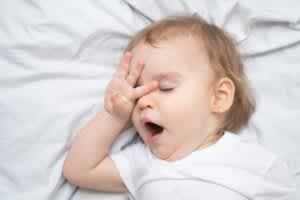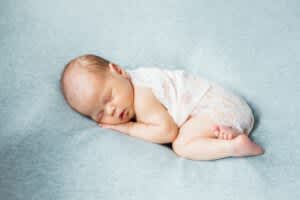Caregivers play an important role in keeping infants and children safe, so it is understandable to be alarmed when seeing a baby repeatedly bang their head while sleeping or falling asleep. Despite its unnerving appearance, caregivers can rest assured that most of the time this behavior is normal and rarely causes any harm.
Head banging occurs in about 1 in 5 babies. Although it is usually a natural part of a baby’s development, in rare cases head banging is associated with a disorder that should be discussed with a pediatrician.
To support caregivers, it may be helpful to understand why babies bang their heads, when head banging may be a sign of a health problem, and when to consult a pediatrician.
What is Head Banging?
Head banging is a type of rhythmic movement that many babies engage in while sleeping or falling asleep. Head banging is often repetitive and caregivers may see this behavior expressed in several different ways.
- Dropping the head: A baby may lift their head or torso while lying down, then bang their head back down onto the mattress.
- Back of the head: Babies may sit up with their head against the headboard, crib, or wall, and repeatedly bang their head backward.
- Top of the head: Babies may rock their body while on their hands and knees, banging the front of their head against the headboard or wall.
- Rolling over: A baby may also roll from side-to-side, banging their head in the process.
Head banging often occurs as a baby is falling asleep but can also happen during sleep. It is common for head banging to be accompanied by loud humming or other vocalizations. Episodes of head banging usually last less than 15 minutes.
Often, baby head banging occurs before babies have started to talk. Children who have developed the ability to speak usually can not remember banging their heads when asked about it in the morning.
Head Banging and Other Rhythmic Movements During Sleep
Head banging is just one of several rhythmic movements that babies engage in as they get to sleep. Other rhythmic movements include body rocking, head rolling, body rolling, and leg banging. It is common for a baby to make loud sounds during all of these rhythmic movements.
According to the American Academy of Sleep Medicine, these behaviors are common in infancy, with 59% of babies displaying one or more types of rhythmic movements, usually between the ages of 9 to 18 months.
The likelihood of sleep-related rhythmic movements drops considerably as babies grow older, with the occurrence of all sleep-related rhythmic movements down to 33% by 18 months and only 5% by the age of 5.
Why Do Babies Bang Their Heads During Sleep?
Although head banging is a common behavior in young children, the reason babies bang their heads during sleep is not well understood. Several theories have been proposed, but more research is needed to fully understand the reasons behind baby head banging.
- Self-soothing: Babies may bang their heads as a way to soothe themselves. Rhythmic movement that stimulates the vestibular system, which controls balance and motion, may have a soothing effect. This calming effect may help a baby get to sleep.
- Stress-relief: Another theory is that babies bang their heads in response to stress.
- Self-stimulation: Some experts suggest that head banging provides self-stimulation. A lack of environmental stimulation has been proposed as a factor leading to sleep-related rhythmic movements, including head banging.
Although the precise reason for head banging is still unclear, experts believe it is generally harmless and may be a part of normal infant development.
Sleep-related rhythmic movements are different from the repetitive body movements seen in children with neurodevelopmental differences, such as autism. For example, movements that may be a symptom of autism most often occur while the child is awake.
Is Head Banging Common During Sleep?
Head banging and other sleep-related rhythmic movements, such as body rocking and head rolling, are common during infancy. More than half of all infants engage in some kind of sleep-related rhythmic movement by the age of 9 months.
Movement | Percentage of Infants Affected |
|---|---|
Head Banging | 22% |
Body Rocking | 43% |
Head Rolling | 24% |
Is Head Banging a Sign of a Health Problem?
Most of the time, head banging is not a sign of a health problem. A large majority of babies who experience head banging are normal with respect to development and intelligence, and outgrow head banging in time. Although it may be unsettling to witness baby head banging, there is little risk of serious injury.
Although most baby head banging is considered developmentally normal, there are some circumstances where rhythmic sleep movements may be indicative of a disorder, rather than a normal sleep-related behavior.
Head banging may be diagnosed as a rhythmic sleep movement disorder when one of the following occurs:
- Significant disruptions to nighttime sleep
- Excessive daytime sleepiness or behavioral issues
- Injury
Although rhythmic movement in infancy is very common, movements that meet the criteria for a disorder are rare. Researchers estimate that only 1% to 3% of children have rhythmic movement that qualifies as a disorder.
When rhythmic movements are serious enough to be considered a disorder, they often persist into adulthood, and may be associated with other medical or developmental conditions and a higher risk of injury.
What Should Caregivers Do About Head Banging While a Baby Sleeps?
It is important for caregivers to bear in mind that unless head banging is injuring the baby or interfering with sleep, it is usually a harmless behavior. While the exact reason for this common behavior is not well understood, experts believe that it is likely that head banging helps the baby in some way.
For additional support, caregivers may want to talk with the baby’s pediatrician.
Shop the Best Crib MattressesWhen to Talk to the Doctor
Although head banging rarely causes medical problems, there are circumstances in which it may be helpful to discuss head banging with a pediatrician.
- Injury: If your baby hits their head hard enough to cause injury, let their pediatrician know. You can ask the pediatrician about safe strategies to prevent injury in the future.
- Lack of sleep: If you suspect your baby is not getting enough sleep because of head banging, let the doctor know about your concern.
- Daytime problems: If your child shows signs of lack of sleep, talk to the doctor about these symptoms and their possible relationship to head banging. Depending on the child’s age, signs they need more sleep can include irritability, fussing, rubbing their eyes, and crying.
- Continued head banging: If your child does not outgrow head banging at the typical age of two or three years, let the pediatrician know.
- Daytime head banging: If you observe head banging and other rhythmic repetitive movements occurring while your child is awake, discuss these behaviors with the child’s doctor.
Tips to Help Improve Baby Sleep
It is normal for sleep patterns to evolve during infancy. Although many of these changes, such as how long a baby sleeps and a head banging phase, are developmentally normal and do not require intervention, there are steps you can take to help your infant establish healthy sleep patterns.
- Encourage daytime activity: Be sure to talk to and play with your baby during the day. This will promote longer periods of wakefulness that will help them sleep longer at night.
- Help your baby wind down as bedtime approaches: Near bedtime, reduce stimulation around your baby by limiting activity and maintaining a quiet, dimly lit environment.
- Stick to a bedtime routine: A regular bedtime routine helps babies fall asleep faster, sleep for longer periods, and experience better quality sleep.
- Create a soothing sleep environment: A quiet, dark environment helps your baby get to sleep faster with fewer interruptions. Be sure to maintain a low-key environment during night time feedings, so your baby can get back to sleep easily.
- Let your baby fall asleep in their bed: Putting your baby to bed when they are drowsy but not yet fully asleep helps them learn to fall asleep by themselves.
Frequently Asked Questions About Baby Heading Banging
Head banging, although usually harmless, can be disturbing for caregivers to witness. Common concerns include fear the baby will hurt themself and worries that head banging could be an early sign of developmental differences.
Injury from head banging is unlikely. Head banging is a common behavior among babies, and the vast majority do not hurt themselves. Even though their behavior may seem alarming to caregivers, especially when it is noisy, head banging in babies almost never leads to injury.
In most cases, head banging in babies is not a sign of autism. Although rhythmic movements may be seen in children with autism spectrum disorders, those repetitive movements usually occur during waking hours.
Most babies who engage in head banging during sleep develop normally. Autism is often associated with other early signs, like delayed language and deficits in social and communication skills.
It is rare for head banging, or other sleep-related rhythmic movements, to cause enough trouble to be classified as a disorder. However, in 1% to 3% of infants, rhythmic sleep movements are considered a disorder because they disturb sleep, cause daytime symptoms, or result in injury.
When severe enough to be classified as a disorder, research suggests that sleep-related rhythmic movements may be associated with other problems. These include:
– Attention-deficit/hyperactivity disorder (ADHD)
– Autism
– Intellectual and learning disabilities
– Mood and anxiety disorders Other sleep disorders, such as restless leg syndrome and obstructive sleep apnea
Almost all babies eventually outgrow head banging and related rhythmic movements related to sleep or falling asleep. It is rare for these behaviors to continue into the teen or adult years.
Sleep-related head banging may continue past the age it is normally outgrown in children with developmental differences, such as attention-deficit/hyperactivity disorder (ADHD). If your child is still head banging after the age of 3, it may be helpful to discuss this with their doctor.
Head banging sometimes occurs when a toddler has a temper tantrum or is stressed during waking hours. In the rare cases where sleep-related rhythmic movements are disruptive enough to be considered a disorder, however, they often occur along with other signs of a mood or anxiety disorder.
Using crib bumpers is unsafe and not recommended. Crib bumper pads have been associated with suffocation deaths in infants. The American Academy of Pediatrics and other professional organizations recommend against the use of crib bumpers.
If noise from head banging is a problem, try moving the crib away from walls. If the concern is about a baby injuring their head because of head banging, it may be helpful to discuss concerns with the baby’s pediatrician.
References
The Sleep Doctor Forum: Real Experiences, Real Connections
Continue the discussion on the Sleep Doctor Forum. Connect with experts and fellow forum members on CPAP, sleep apnea, and all things sleep. A priceless resource that’s free to join.








































